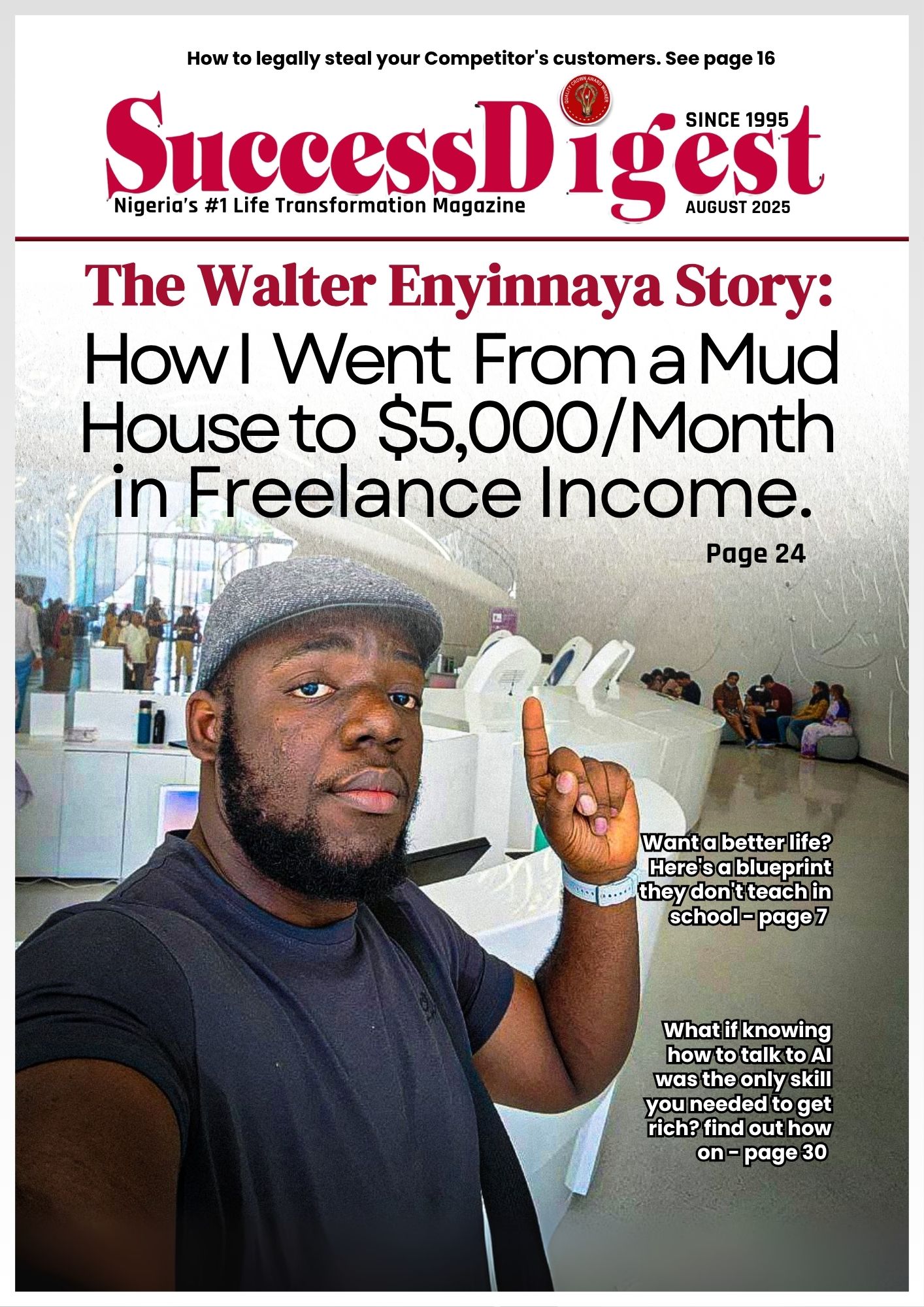HAVE you been holding yourself back from doing something really positive because you are worried about what people will say about you for doing it?
For example, if you decide to start selling garri at the main township market because that is the only idea that comes to your mind as a means of putting food on the table for your family, will you go out and do it or will you hold back because of what family members, friends, and neighbors will say?
For the majority of people, the choice is to hold back. They find themselves trapped by that most damning of all questions:
“What will XYZ think when they find me selling garri in the market? I who, a short three months ago, was the branch manager of ABC Company? I who, less than a month ago, was giving money away to people to assist them?”
For such people, as days, weeks, months, and even years pass while tormenting their souls with these questions, their condition deteriorates. They become poorer with the passage of time. Worse still, they start to recoil into themselves, afraid to face the world.

Do you know what happens to such people in the end? The evil day usually dawns on them. They find they are face to face with disaster. Like having to totally depend on others for things like feeding their children, paying their rent, medical bills, and so on.
When this evil day does come, the same family members, friends, and neighbors that they were considering for not taking the action that was so obviously in their best interest, would be the first to start condemning their inaction.
They would say something like:
“Stupid fellow: Couldn’t he have gotten something to do even if it was to sell Garri? See the shame he’s brought upon his family!”
If what happened to the victims of these damning questions didn’t involve death and they could hear these comments, tears of regret would well up in their eyes and they would allow them to flow freely down their cheeks. But by this time it is almost too late.
What will people say? It is a double-edged sword question and it cuts neatly both ways. The other side is when you fail to pay attention to the same question when you are about to do anything that even your own mind tells you is disgraceful or dangerous to do.
For instance, if as a result of losing your job, you can’t put food on the dining table and your family is starving, and the crazy thought drops into your mind to go and steal food at the local market, the question will definitely pop into your mind: “What will people say if I’m caught?” Unless you are not a first-timer.
Your response to this question will determine the action you take. If you are still sane, you will tell the thought to go to hell. You will pursue it with:
“I, should go and steal? I, to whom God gave a creative mind with which I am free to create an exciting world for myself, should ruin my future prospects by descending so low as to go and steal? God forbid”!
The thought to go and steal may persist. But you have the God-given power within you to say ‘No!’ to that evil thought. If you feel you are unable to resist it on your own, you have a Comforter in Jesus Christ to appeal to for help through prayers. And He will come to your rescue.
Where you fail to do this and give in to that horrible tempting thought and you get caught, the double-edged sword question of what people will say will slice through you mercilessly like a hot knife through butter.
The question, therefore, is:
“How may one avoid bleeding to death from the wound inflicted by either side of this sharpest of all swords?”
Truth is, it is not always easy to avoid being sliced by this sword. But if you can adopt the type of mindset that I developed in 1984 when I set up shop as a sports magazine publisher, you can get rid of this debilitating question.
Within two months of my going solo, I was involved in an accident that would, but for the special grace of God, write off the only car my business depended on for its operations. We were returning from the National Stadium where we had gone for a direct sales campaign of Sports Souvenir when I narrowly missed being hit head-on by a drunken driver who rammed his car into the side of my Volkswagen Passat and sent the boot flying several meters away.
Had that car hit mine head-on, my aspirations to build my own business would probably have been grounded for good right there and then. But I got away from the accident scene with a car without a boot and whose side had been badly dented.
For at least three months after the accident, I was driving everywhere in Lagos with this car as it was. I neither had the time nor the money to send the car to the garage for repairs. I used to watch relations and friends eye the car with a shake of their heads, silently pitying me for abandoning the security of my paid job at The Guardian, to embrace what at the time looked like a hopeless struggle to be financially free.
When they saw a battered car, my mind’s eye was fixed at that point in the future when I would be able to buy whatever car I wanted whenever I wanted it. I was totally oblivious to what they were saying behind my back. I didn’t give a damn. I was absolutely committed to my goal. It was the only destination that mattered.
Looking back, if I had for one-second thought of the disgrace it was to drive that sort of car around the streets of Lagos, believe me, I would have crippled my ambition to be what God has made me today.
The point I’m making should be clear to you now: Don’t ask yourself what people will say if you are convinced that it is in your best interest to do what you want to do. You should allow the same question to be your guide if you are sure that what you want to do will not edify you, your family, your society, your country, and, above all, your God if you do it.
Are You Uncomfortable With Wealth?
A lot of good can flow from money acquired the right way and spent the right way. However, there is a vast majority of people who are uncomfortable with wealth accumulation. To these people, acquiring wealth is like assembling evidence that would damn one to hell on Judgment Day.
Since there are teachings in most leading religions, Christianity inclusive, which appear to support this view, many are at odds about what their approach to the subject should be. So confused are many about this subject that it has prevented them from achieving their true potentials.
Let’s examine what wealth is. In today’s world, there is nothing that can replace the part money plays. To give your children the right sort of education; to prevent your family from going hungry and to provide them a decent shelter, you need a regular supply of money.
If you or anybody in your family has a serious health problem, doctors at hospitals will hardly listen to any story that, at the end of the day, does not fill the right figures on your cheque.
And when you grow old, and you can no longer work, the money that you had set aside while you were younger and working will be what you will fall back on. Without enough of it, your old age will certainly be miserable.

Unless, of course, you have children who are working and making enough money to take care of themselves and have some to spare for taking care of you.
Anyone who cannot provide for these things mentioned above will be a very unhappy person indeed. While it is true that there are those who make up their minds to do without these things; that is, they decide not to start a family so that they are not responsible for anybody’s well-being; such people are in the minority.
The majority of the rest of the human race tends towards the other way. They crave to raise a family. And they worry about what their old age would be like. These two desires combined, lead them in search of money. You cannot satisfy these needs without having money. That is the truth.
And it is the need to be financially free; to have money to do these things when the need arises, that leads directly to wealth accumulation; for unless you accumulate money, there is no guarantee that you will always get it to spend when you need it.
At this point, we ought to define what wealth is. There are as many definitions as the people define it. However, wealth to SuccessDigest is being in a position to pay all your bills and still have some left to take care of your future needs.
In other words, when you are constantly in a position to pay for all the services that have been rendered to you by others and are still left with some money for future emergencies, then you are a wealthy man or woman. Or what we describe as being financially free.
Notice that no figures were mentioned. This is because individual tastes are different. The key thing is the level of contentment. Once you have reached the point where you are satisfied with what you can provide of those basic things earlier highlighted without feeling you need more and are unable to have it, then that is your level of wealth.
No one can tell you how wealthy you should be, or say you are not wealthy because he has a dozen cars and 20 houses while you ride a car and have only one house.
Having defined what SuccssDigest means when we talk about being wealthy, we should proceed from there to look at why many feel it is wrong to have wealth. As earlier mentioned, most people become skeptical about wealth; and have feelings of guilt about it just as they do about sex, purely on religious grounds.
But the material things that money buys, the services rendered by others which money pays for, just as the children that come forth from procreation, are the creations of God. God made them because He wanted man to use them intelligently. The Bible says that everything that God created was very good. Genesis 1:31. That is one biblical statement that no one can argue and the Bible never says that having money is wrong.
What Apostle Paul told Timothy in I Timothy 6:10 is that “the love of money is the root of all evil”. Read that again. It didn’t say money is the root of all evil, but the love of money is the problem. The same Apostle Paul was inspired to write as follows in 1 Timothy 6: 17-19: “Charge them that are rich in this world, that they are not high minded, nor trust in uncertain riches, but in the living God, who giveth us richly all things to enjoy;
”That they do good, that they are rich in good works, ready to distribute, willing to communicate; laying up in store for themselves a good foundation against the time to come, that they may lay hold on eternal life.” (KJV: the New Open Bible Study Edition).
Did you get that? Does that sound like Paul saying wealth is bad? No, it doesn’t. Neither did the Messiah, Jesus Christ, when he told that rich young ruler in Mathew 19:21 to go and sell his earthly possessions, give them to the poor so he could lay his treasure in heaven, and follow him.
What Christ taught here, which is the most important lesson anyone needs to learn about wealth accumulation, is that at no time should our material possessions take the place of God in our life, as it evidently did in the case of this young man.
And equally important, is that we must be prepared to share the blessings we receive from God with others who are less privileged, for it is God who gives us the power to have wealth (Deuteronomy 8:18). We should never forget that. Never.
Quote:
“If you decide to start selling garri at the main township market because that is the only idea that comes to your mind as a means of putting food on the table for your family, will you go out and do it or will you hold back because of what family members, friends and neighbours will say? For the majority of people, the choice is to hold back….”
“Do you know what happens to such people in the end? The evil day usually dawns on them. They find they are face to face with disaster. Like having to totally depend on others for things like feeding their children, paying their rents, medical bills and so on”















